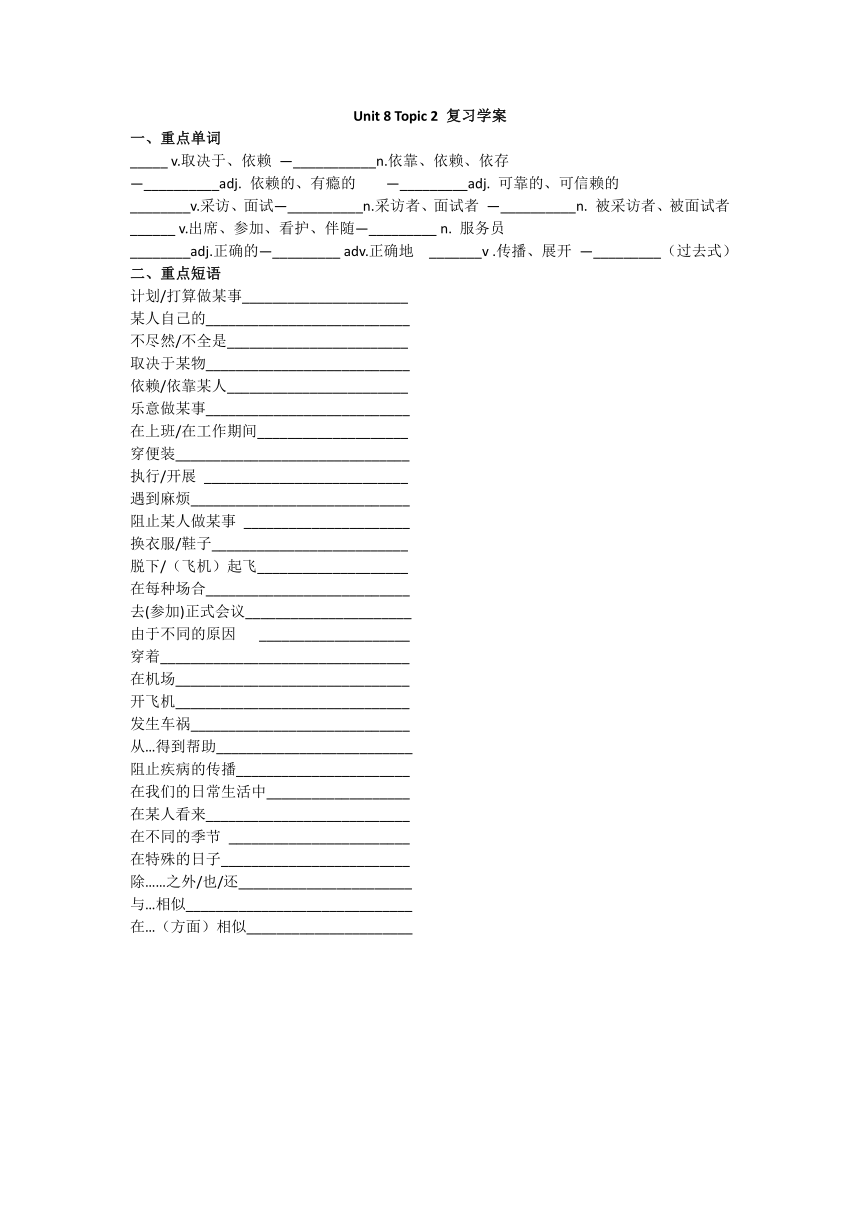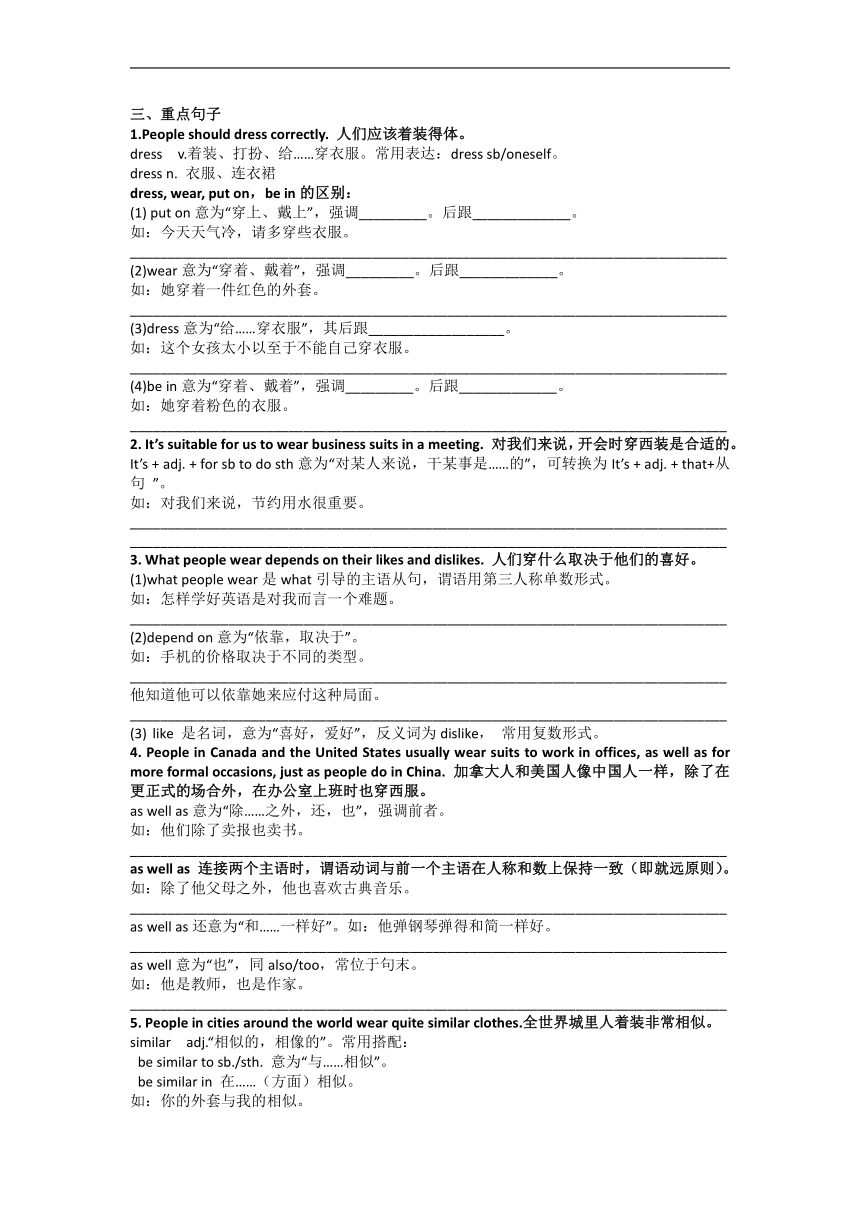Unit 8 Topic 2 复习学案(无答案)2022-2023学年仁爱版英语八年级下册
文档属性
| 名称 | Unit 8 Topic 2 复习学案(无答案)2022-2023学年仁爱版英语八年级下册 |

|
|
| 格式 | docx | ||
| 文件大小 | 20.2KB | ||
| 资源类型 | 教案 | ||
| 版本资源 | 仁爱科普版 | ||
| 科目 | 英语 | ||
| 更新时间 | 2023-03-28 15:14:07 | ||
图片预览


文档简介
Unit 8 Topic 2 复习学案
重点单词
_____ v.取决于、依赖 —___________n.依靠、依赖、依存
—__________adj. 依赖的、有瘾的 —_________adj. 可靠的、可信赖的
________v.采访、面试—__________n.采访者、面试者 —__________n. 被采访者、被面试者
______ v.出席、参加、看护、伴随—_________ n. 服务员
________adj.正确的—_________ adv.正确地 _______v .传播、展开 —_________(过去式)
重点短语
计划/打算做某事______________________
某人自己的___________________________
不尽然/不全是________________________
取决于某物___________________________
依赖/依靠某人________________________
乐意做某事___________________________
在上班/在工作期间____________________
穿便装_______________________________
执行/开展 ___________________________
遇到麻烦_____________________________
阻止某人做某事 ______________________
换衣服/鞋子__________________________
脱下/(飞机)起飞____________________
在每种场合___________________________
去(参加)正式会议______________________
由于不同的原因 ____________________
穿着_________________________________
在机场_______________________________
开飞机_______________________________
发生车祸_____________________________
从…得到帮助__________________________
阻止疾病的传播_______________________
在我们的日常生活中___________________
在某人看来___________________________
在不同的季节 ________________________
在特殊的日子_________________________
除……之外/也/还_______________________
与…相似______________________________
在…(方面)相似______________________
重点句子
1.People should dress correctly. 人们应该着装得体。
dress v.着装、打扮、给……穿衣服。常用表达:dress sb/oneself。
dress n. 衣服、连衣裙
dress, wear, put on,be in的区别:
(1) put on意为“穿上、戴上”,强调_________。后跟_____________。
如:今天天气冷,请多穿些衣服。
_______________________________________________________________________________
(2)wear意为“穿着、戴着”,强调_________。后跟_____________。
如:她穿着一件红色的外套。
_______________________________________________________________________________
(3)dress意为“给……穿衣服”,其后跟__________________。
如:这个女孩太小以至于不能自己穿衣服。
_______________________________________________________________________________
(4)be in意为“穿着、戴着”,强调_________。后跟_____________。
如:她穿着粉色的衣服。
_______________________________________________________________________________
2. It’s suitable for us to wear business suits in a meeting. 对我们来说,开会时穿西装是合适的。
It’s + adj. + for sb to do sth意为“对某人来说,干某事是……的”,可转换为It’s + adj. + that+从句 ”。
如:对我们来说,节约用水很重要。
_______________________________________________________________________________
_______________________________________________________________________________
3. What people wear depends on their likes and dislikes. 人们穿什么取决于他们的喜好。
(1)what people wear是what引导的主语从句,谓语用第三人称单数形式。
如:怎样学好英语是对我而言一个难题。
_______________________________________________________________________________
(2)depend on意为“依靠,取决于”。
如:手机的价格取决于不同的类型。
_______________________________________________________________________________
他知道他可以依靠她来应付这种局面。
_______________________________________________________________________________
like 是名词,意为“喜好,爱好”,反义词为dislike, 常用复数形式。
4. People in Canada and the United States usually wear suits to work in offices, as well as for more formal occasions, just as people do in China. 加拿大人和美国人像中国人一样,除了在更正式的场合外,在办公室上班时也穿西服。
as well as意为“除……之外,还,也”,强调前者。
如:他们除了卖报也卖书。
_______________________________________________________________________________
as well as 连接两个主语时,谓语动词与前一个主语在人称和数上保持一致(即就远原则)。
如:除了他父母之外,他也喜欢古典音乐。
_______________________________________________________________________________
as well as还意为“和……一样好”。如:他弹钢琴弹得和简一样好。
_______________________________________________________________________________
as well意为“也”,同also/too,常位于句末。
如:他是教师,也是作家。
_______________________________________________________________________________
5. People in cities around the world wear quite similar clothes.全世界城里人着装非常相似。
similar adj.“相似的,相像的”。常用搭配:
be similar to sb./sth. 意为“与……相似”。
be similar in 在……(方面)相似。
如:你的外套与我的相似。
_______________________________________________________________________________
这两座房子大小差不多。
_______________________________________________________________________________
拓展:
与……相同____________________________ 与……不同____________________________
重点短语
宾语从句
概念
位于______________________之后在句子中起______________________作用的完整句子叫做宾语从句。
引导词
that + ___________________________________
He likes English a lot. I know. (合并成句)
_______________________________________________________________________________
(2)if/whether + ___________________________________
Is he from England? I don’t know.(合并成句)
_______________________________________________________________________________
(3)特殊疑问词 + ___________________________________
Where is he from? I wonder.(合并成句)
_______________________________________________________________________________
语序
宾语从句应使用___________________。
时态
主现从不限
主句使用一般现在时,从句可用任何时态,不受主句限制。
主过从过
主句使用一般过去时,从句使用相应的过去时态。
从句:一般现在时
当从句表示客观事实、科学真理等时,只用一般现在时。
【当堂练习】
一、将下面的句子连接成为含有宾语从句的复合句。
1. These flowers are from Guangdong. He said.
He said _______ these flowers _______ from Guangdong.
2. Light travels faster than sound. My teacher told me.
My teacher told me _____ light _______ faster than sound.
3. There will be a meeting in five days. Jack didn’t know.
Jack didn’t know _____ there _____ ____ a meeting in five days.
4. Can they speak French I want to know.
I want to know ______ _______ _______ _______ French.
5. Are the children playing games Tell me.
Tell me ______ the children ______ ______ games.
6. Have you finished your homework yet Mr. Zhao asked Ma Gang.
Mr. Zhao asked Ma Gang ____ _____ ____ ____ ___ homework yet.
7. How many people can you see in the picture Who knows
Who knows ______ _____ _____ ____ _____ ______ in the picture
8. Where did she park her car Do you know
Do you know _____ _____ ____ her car
9. What does he often talk about The girl wondered.
The girl wondered _____ _____ often ________ about.
10. Who knocked at the door so loudly I don’t know.
I don’ t know ____ _______ at the door so loudly.
11. Does he still live in that street I don't know.
I don't know ______ he still _______ in that street.
12. What's his name I asked him.
I asked him what _____ _____ _____.
13. When does the train arrive Please tell me.
Please tell me ________ _________ ________ _________.
14. Do they want fried chicken He asked the boys.
He asked the boys _______ they ______ fried chicken.
15. Was the watch made in Shanghai I don't know.
I don't know _______ the watch _______ made in Shanghai.
完成句子
I wanted to know______________________________________(她正在和谁交谈)
2. He said________________________________________________(他以前见过我)
3. I'm sorry for__________________________________________(我曾经所做的事)
4. The teacher asked____________________________________(谁能回答这个问题)
5. Jane said that_______________________________________(她将乘飞机去美国)
6. I wanted to know______________________________________(她是否有一些钱)
7. We haven't decided________________________________(我们接下来该做什么)
8. I think that English is________________________________________(没有数学难)
9. I'm not sure_________________________________________(昨天天气是否晴朗)
10. He asked me___________________________________(我是如何处理这件事的)
11. Do you know_________________________________________(明天是否要下雨)
12. I wanted to know___________________________________(她来还是不来)
三、用所给动词的正确形式填空。
1. We are sure that he ________ (go) to school tomorrow.
2. Do you know who ______ (be) the first man to walk on the moon
3. Could you tell me where the post office ______ (is)
4. Our father said that he _______ (will) buy a new computer.
5. I hear that he _______ (swim) in the sea yesterday.
6. The little boy tells us where his father _______ (work).
7. He said that he _________ (finish) his work already.
8. They thought they could _______ (hike) to the top of the mountain.
9. He was glad that so many people _____ (help) him.
10. She doesn’t know whether ________ (go) or wait.
重点单词
_____ v.取决于、依赖 —___________n.依靠、依赖、依存
—__________adj. 依赖的、有瘾的 —_________adj. 可靠的、可信赖的
________v.采访、面试—__________n.采访者、面试者 —__________n. 被采访者、被面试者
______ v.出席、参加、看护、伴随—_________ n. 服务员
________adj.正确的—_________ adv.正确地 _______v .传播、展开 —_________(过去式)
重点短语
计划/打算做某事______________________
某人自己的___________________________
不尽然/不全是________________________
取决于某物___________________________
依赖/依靠某人________________________
乐意做某事___________________________
在上班/在工作期间____________________
穿便装_______________________________
执行/开展 ___________________________
遇到麻烦_____________________________
阻止某人做某事 ______________________
换衣服/鞋子__________________________
脱下/(飞机)起飞____________________
在每种场合___________________________
去(参加)正式会议______________________
由于不同的原因 ____________________
穿着_________________________________
在机场_______________________________
开飞机_______________________________
发生车祸_____________________________
从…得到帮助__________________________
阻止疾病的传播_______________________
在我们的日常生活中___________________
在某人看来___________________________
在不同的季节 ________________________
在特殊的日子_________________________
除……之外/也/还_______________________
与…相似______________________________
在…(方面)相似______________________
重点句子
1.People should dress correctly. 人们应该着装得体。
dress v.着装、打扮、给……穿衣服。常用表达:dress sb/oneself。
dress n. 衣服、连衣裙
dress, wear, put on,be in的区别:
(1) put on意为“穿上、戴上”,强调_________。后跟_____________。
如:今天天气冷,请多穿些衣服。
_______________________________________________________________________________
(2)wear意为“穿着、戴着”,强调_________。后跟_____________。
如:她穿着一件红色的外套。
_______________________________________________________________________________
(3)dress意为“给……穿衣服”,其后跟__________________。
如:这个女孩太小以至于不能自己穿衣服。
_______________________________________________________________________________
(4)be in意为“穿着、戴着”,强调_________。后跟_____________。
如:她穿着粉色的衣服。
_______________________________________________________________________________
2. It’s suitable for us to wear business suits in a meeting. 对我们来说,开会时穿西装是合适的。
It’s + adj. + for sb to do sth意为“对某人来说,干某事是……的”,可转换为It’s + adj. + that+从句 ”。
如:对我们来说,节约用水很重要。
_______________________________________________________________________________
_______________________________________________________________________________
3. What people wear depends on their likes and dislikes. 人们穿什么取决于他们的喜好。
(1)what people wear是what引导的主语从句,谓语用第三人称单数形式。
如:怎样学好英语是对我而言一个难题。
_______________________________________________________________________________
(2)depend on意为“依靠,取决于”。
如:手机的价格取决于不同的类型。
_______________________________________________________________________________
他知道他可以依靠她来应付这种局面。
_______________________________________________________________________________
like 是名词,意为“喜好,爱好”,反义词为dislike, 常用复数形式。
4. People in Canada and the United States usually wear suits to work in offices, as well as for more formal occasions, just as people do in China. 加拿大人和美国人像中国人一样,除了在更正式的场合外,在办公室上班时也穿西服。
as well as意为“除……之外,还,也”,强调前者。
如:他们除了卖报也卖书。
_______________________________________________________________________________
as well as 连接两个主语时,谓语动词与前一个主语在人称和数上保持一致(即就远原则)。
如:除了他父母之外,他也喜欢古典音乐。
_______________________________________________________________________________
as well as还意为“和……一样好”。如:他弹钢琴弹得和简一样好。
_______________________________________________________________________________
as well意为“也”,同also/too,常位于句末。
如:他是教师,也是作家。
_______________________________________________________________________________
5. People in cities around the world wear quite similar clothes.全世界城里人着装非常相似。
similar adj.“相似的,相像的”。常用搭配:
be similar to sb./sth. 意为“与……相似”。
be similar in 在……(方面)相似。
如:你的外套与我的相似。
_______________________________________________________________________________
这两座房子大小差不多。
_______________________________________________________________________________
拓展:
与……相同____________________________ 与……不同____________________________
重点短语
宾语从句
概念
位于______________________之后在句子中起______________________作用的完整句子叫做宾语从句。
引导词
that + ___________________________________
He likes English a lot. I know. (合并成句)
_______________________________________________________________________________
(2)if/whether + ___________________________________
Is he from England? I don’t know.(合并成句)
_______________________________________________________________________________
(3)特殊疑问词 + ___________________________________
Where is he from? I wonder.(合并成句)
_______________________________________________________________________________
语序
宾语从句应使用___________________。
时态
主现从不限
主句使用一般现在时,从句可用任何时态,不受主句限制。
主过从过
主句使用一般过去时,从句使用相应的过去时态。
从句:一般现在时
当从句表示客观事实、科学真理等时,只用一般现在时。
【当堂练习】
一、将下面的句子连接成为含有宾语从句的复合句。
1. These flowers are from Guangdong. He said.
He said _______ these flowers _______ from Guangdong.
2. Light travels faster than sound. My teacher told me.
My teacher told me _____ light _______ faster than sound.
3. There will be a meeting in five days. Jack didn’t know.
Jack didn’t know _____ there _____ ____ a meeting in five days.
4. Can they speak French I want to know.
I want to know ______ _______ _______ _______ French.
5. Are the children playing games Tell me.
Tell me ______ the children ______ ______ games.
6. Have you finished your homework yet Mr. Zhao asked Ma Gang.
Mr. Zhao asked Ma Gang ____ _____ ____ ____ ___ homework yet.
7. How many people can you see in the picture Who knows
Who knows ______ _____ _____ ____ _____ ______ in the picture
8. Where did she park her car Do you know
Do you know _____ _____ ____ her car
9. What does he often talk about The girl wondered.
The girl wondered _____ _____ often ________ about.
10. Who knocked at the door so loudly I don’t know.
I don’ t know ____ _______ at the door so loudly.
11. Does he still live in that street I don't know.
I don't know ______ he still _______ in that street.
12. What's his name I asked him.
I asked him what _____ _____ _____.
13. When does the train arrive Please tell me.
Please tell me ________ _________ ________ _________.
14. Do they want fried chicken He asked the boys.
He asked the boys _______ they ______ fried chicken.
15. Was the watch made in Shanghai I don't know.
I don't know _______ the watch _______ made in Shanghai.
完成句子
I wanted to know______________________________________(她正在和谁交谈)
2. He said________________________________________________(他以前见过我)
3. I'm sorry for__________________________________________(我曾经所做的事)
4. The teacher asked____________________________________(谁能回答这个问题)
5. Jane said that_______________________________________(她将乘飞机去美国)
6. I wanted to know______________________________________(她是否有一些钱)
7. We haven't decided________________________________(我们接下来该做什么)
8. I think that English is________________________________________(没有数学难)
9. I'm not sure_________________________________________(昨天天气是否晴朗)
10. He asked me___________________________________(我是如何处理这件事的)
11. Do you know_________________________________________(明天是否要下雨)
12. I wanted to know___________________________________(她来还是不来)
三、用所给动词的正确形式填空。
1. We are sure that he ________ (go) to school tomorrow.
2. Do you know who ______ (be) the first man to walk on the moon
3. Could you tell me where the post office ______ (is)
4. Our father said that he _______ (will) buy a new computer.
5. I hear that he _______ (swim) in the sea yesterday.
6. The little boy tells us where his father _______ (work).
7. He said that he _________ (finish) his work already.
8. They thought they could _______ (hike) to the top of the mountain.
9. He was glad that so many people _____ (help) him.
10. She doesn’t know whether ________ (go) or wait.
同课章节目录
- Unit 5 Feeling excited
- Topic 1 You look excited
- Topic 2 I’m feeling better now.
- Topic 3 Many things can affect our feelings.
- Unit 6 Enjoying Cycling
- Topic 1 We're going on a three-day visit to Mount
- Topic 2 How about exploring Tian’anmen Square?
- Topic 3 Bicycle riding is good exercise.
- Unit 7 Food festival
- Topic 1 We’re preparing for a food festival.
- Topic 2 I’m not sure whether I can cook it well.
- Topic 3 I Cooked the Most Successfully
- Unit 8 Our Clothes
- Topic 1 We will have a class fashion show.
- Topic 2 We can design our own uniforms.
- Topic 3 He said the fashion show was wonderful.
